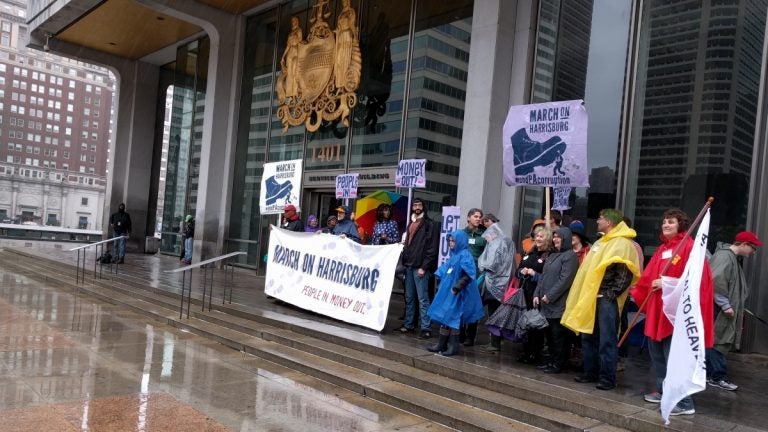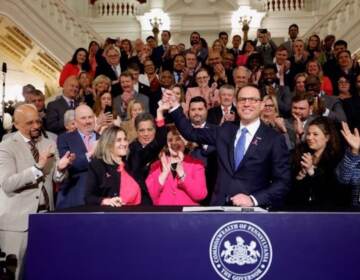Ending gerrymandering is fundamental, but Harrisburg doesn’t want to hear it
Fixing gerrymandering is one of the most pressing repairs we can apply to our faltering democracy, but leaders in our state government are all but refusing to discuss it.

Protesters gather at the Municipal Services Building in Center City Philadelphia in May before setting off on a march to Harrisburg. (Aaron Kase for NewsWorks)
Imagine caring enough about good government to walk over 100 miles to the state capital to make your voice heard — and then getting arrested at the end of the trip. That’s what happened this spring when several dozen members of the March on Harrisburg group gathered in downtown Philadelphia on a cold, rainy May morning, circled City Hall and set out on the nine-day trek across the state.
Among other reforms, the group was marching to raise support for legislation to fix the redistricting process in Pennsylvania, which for decades has been plagued by brazen gerrymandering, or deliberately drawing district lines to maximize partisan advantage and protect incumbents. Lawmakers insulated from the threat of being voted out of office are only accountable to their donors, not to everyday residents of the state.
Fixing gerrymandering is one of the most pressing and fundamental repairs we can apply to our faltering democracy, but leaders in our state government are all but refusing to discuss it, and time is running out. Legislation in the form of House Bill 722 and Senate Bill 22 would take the ability to draw districts away from the legislature and put it in the hands of an independent commission, promoting stable, compact districts that represent coherent geographic regions, as opposed to the mess of a map we have today.
However, since the bills would require a constitutional change, they need to be passed in successive sessions, then put to the people of Pennsylvania for a vote, meaning that they must be approved initially by the summer of 2018 if there is any chance for reforms to be in place by 2020, when the next census is carried out.
Despite the pressing timeline, legislative leaders are stalling, or ignoring the issue altogether. In the Senate, State Government Committee Chairman Mike Folmer said he won’t hold any more hearings on the bill until a lawsuit filed over the results of the last round of redistricting is resolved. The House bill already has close to majority support in co-sponsors alone, but State Government Committee Chairman Daryl Metcalfe has effectively dismissed the matter, called it a “back-burner issue” that voters don’t care about.
One motivation for the march was to show him that he’s wrong, that everyday people are invested in fixing our government. “These sort of good-government issues are definitely not the sexiest of social justice issues,” says Emmie DiCicco, communications director for the March on Harrisburg. But, she says, activists in other social justice areas like criminal justice, education and the environment continually find themselves frustrated and stalled by dysfunction in the Pennsylvania government.
“The real core of gerrymandering is it creates and promotes hyper-partisanship,” DiCicco says. “When you connect gerrymandering and good government to something people care about and feel strongly about, you see why your voice is being drowned out. It incites people.” In other words, to successfully address nearly any cause important to the citizens of Pennsylvania, we need to first reform the legislature into a responsive, functioning body.
Gerrymandering is particularly bad in our state, ranking as one of the three worst in the nation according to a report by the Brennan Center for Justice at New York University Law School. The twisted map, weaving around municipalities and stretching some districts nearly halfway across the state, splits up some communities while putting others in vastly disparate locations under a single representative.
Effectively, partisan redistricting gives the majority party the opportunity to pick its own voters. The Republicans currently hold the advantage — the GOP controlled the process during the last round of redistricting and carved out districts that, for example, secured 13 out of 18 congressional seats for the party despite a near 50-50 split in overall votes and almost one million more registered Democrat voters — but gerrymandering is at heart a non-partisan issue. If Democrats were to win big in 2020 races, there’s nothing currently to stop them from creating a similarly tortured and unfair map that effectively disenfranchises Republican voters.
Nevertheless, Metcalfe refused to meet with the marchers in May, prompting them to sit down in his office until they were arrested. Undeterred, the group is continuing to lobby lawmakers every day the legislature is in session this fall and is conducting outreach activities around the state. On Nov. 10, they will march again, this time from Lancaster, to descend on the Capitol building and try to push the bill toward a vote.
The idea is to get the government to work for the people, not for donors and lobbyists, and forcing legislators to be responsive to their constituents is an important first step. When the marchers set out from Philadelphia last spring, the group’s Executive Director Michael Pollack spoke in front of the Municipal Services Building about repairing our fragile system. “Democracy is based on public trust,” he told the assembled citizens standing proudly in the rain. “That trust has been broken.”
The time to repair it is growing short.
WHYY is your source for fact-based, in-depth journalism and information. As a nonprofit organization, we rely on financial support from readers like you. Please give today.




